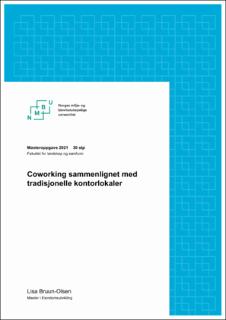| dc.contributor.advisor | Boge, Knut | |
| dc.contributor.author | Bruun-Olsen, Lisa Myrmel | |
| dc.date.accessioned | 2022-01-11T10:50:15Z | |
| dc.date.available | 2022-01-11T10:50:15Z | |
| dc.date.issued | 2021 | |
| dc.identifier.uri | https://hdl.handle.net/11250/2836876 | |
| dc.description.abstract | Masteroppgaven er basert på en komparativ casestudie av Case 1 ”coworking-aktører” og Case 2 ”gårdeiere som drifter coworking i egen regi”, hvor det er gjennomført intervjuer med fem intervjuobjekter innenfor hvert case. Formålet med studien er å kartlegge fordelene og ulempene med coworking sammenlignet med tradisjonelle kontorlokaler. Problemstillingen i studien er:
”Hvilke fordeler og ulemper har coworking i forhold til tradisjonelle kontorlokaler?”
Coworking gir større fleksibilitet både for medlemmene av coworking-arealene og gårdeierne som drifter konseptet i leieavtalene med kortere oppsigelsestid, i kontorløsningene og i hvor man jobber fra. Det er en god mulighet for mindre selskaper å sikre seg fine lokaler uten at det er kapitalbindene eller at man må binde seg til en lang kontrakt. Det er en fordel for større selskaper ved at de kan bruke fasilitetene i coworking-arealene, samt opp-og nedskalere raskt ved behov. Det er et godt grunnlag for gårdeierne ved at de kan tilby lokaler til et større markedssegment, og hvor de små selskapene kan vokse seg inn i tradisjonelle kontorer på sikt. Det er også kostnadsbesparende for alle selskaper ved at man kun betaler for arealene man bruker. Videre kan coworking gi positive synergier til bygget og området ved at det skaper mer liv og tiltrekker en bred variasjon av mennesker og selskaper. En annen fordel for medlemmene er nettverket og muligheten for nye samarbeidspartnere gjennom coworking-konseptet. Det kan videre være med på å gi en bedre balanse mellom jobb og fritid ved etablering av coworking-sentre i utkanten av byen og i nærheten til der man bor.
Likevel er det en høyere risiko ved utleie av coworking-arealer sammenlignet med tradisjonelle kontorlokaler hvor fleksibiliteten gjør at gårdeierne er mer sensitiv for svingninger i markedet. Det har vært en overetablering av coworking de siste årene som har ført til høy konkurranse blant coworking-aktørene og et stor prispress. Samtidig mener flere at det er et stort potensiale for høyere inntjening enn ved tradisjonell utleie på sikt. | en_US |
| dc.description.abstract | The master's thesis is based on a comparative case study of Case 1 "coworking operators" and Case 2 "landlords who operate coworking spaces through self-management", where interviews were conducted with five interview objects within each case. The purpose of the study is to map the advantages and disadvantages of coworking related to traditional office space. The main problem in the study is:
"What are the advantages and disadvantages of coworking compared to traditional office space?"
Coworking provides greater flexibility both for the members of the coworking areas and the landlords who operate the concept in the lease agreements with a shorter notice period in the office space. It is a greater opportunity for smaller companies to take place in premises without the capital tied up or having to commit to a long contract. It is an advantage for larger companies that they can use the facilities in the coworking areas, as well as reduced and/or increase areas when needed. It is a good opportunity for landlords to have the possibility to offer premises to larger market segment, where small companies in the long run can grow into traditional offices. It is also reducing costs for all companies when you pay for the areas that is used. Furthermore, coworking can provide positive synergies to the building and the area that it creates more life and attracts a wide variety of people and companies. Another advantage for the members is the network and the opportunity for new partners that establishes within the coworking concept.
Nevertheless, there is a higher risk when renting out coworking areas compared to traditional office premises where the flexibility makes the landlords more sensitive to fluctuations in the market. There has been an over-establishment of operators in recent years, which has led to high competition and a possibility of a greater deal. On the other hand, manifold consider there would be a great potential for greater earnings than with traditional rental in the long run. | en_US |
| dc.language.iso | nob | en_US |
| dc.publisher | Norwegian University of Life Sciences, Ås | en_US |
| dc.rights | Attribution-NonCommercial-NoDerivatives 4.0 Internasjonal | * |
| dc.rights.uri | http://creativecommons.org/licenses/by-nc-nd/4.0/deed.no | * |
| dc.subject | Coworking | en_US |
| dc.subject | Delingsøkonomi | en_US |
| dc.subject | Sharing economy | en_US |
| dc.title | Coworking sammenlignet med tradisjonelle kontorlokaler | en_US |
| dc.type | Master thesis | en_US |
| dc.description.localcode | M-EUTV | en_US |

